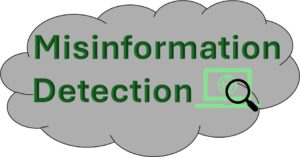 The rise of social media platforms as Online Health Information Sources (OHIS) has increased the spread of health related narratives in cyberspace. The rapid dissemination of false or misleading health information, particularly in public health, can have severe consequences. Narratives could endanger public health and also poses significant cybersecurity risks, including eroding trust in credible sources, enabling phishing attacks, and heightening the impact of cyber threats during crises.
The rise of social media platforms as Online Health Information Sources (OHIS) has increased the spread of health related narratives in cyberspace. The rapid dissemination of false or misleading health information, particularly in public health, can have severe consequences. Narratives could endanger public health and also poses significant cybersecurity risks, including eroding trust in credible sources, enabling phishing attacks, and heightening the impact of cyber threats during crises.
This research aims to measure the risks associated with Health Narratives using advanced techniques like Natural Language Processing (NLP), Knowledge Graphs, and Semantic Reasoners, with a particular focus on strengthening cybersecurity. We have built a comprehensive framework to detect, quantify and classify health narratives using AI techniques like NLP, Knowledge Graphs, and Semantic Reasoners.
Project Members
Faculty: Dr. Karuna P Joshi
Students: Ommo Clark
Publications
- O. Clark and K. P. Joshi, “Real-Time Detection of Online Health Misinformation using an Integrated Knowledgegraph-LLM Approach“, IEEE International Conference on Digital Health (ICDH) , 2025 at IEEE World Congress on Services 2025, July 2025
- O. Clark and K. P. Joshi, “Evaluating Causal AI Techniques for Health Misinformation Detection“, Causal AI for Robust Decision Making (CARD 2025) Workshop, held in conjunction with 23rd International Conference on Pervasive Computing and Communications (PerCom 2025), March 2025
- O. Clark, K. P. Joshi, and T. Reynolds, “Global Relevance of Online Health Information Sources: A Case Study of Experiences and Perceptions of Nigerians“, AMIA 2024 Annual Symposium, November 2024.
- O. Clark, T. Reynolds, E. Ugwuabonyi, and K. P. Joshi, “Exploring the Impact of Increased Health Information Accessibility in Cyberspace on Trust and Self-care Practices“, The 2024 ACM Workshop on Secure and Trustworthy Cyber-Physical Systems (SaT-CPS ’24), June 2024